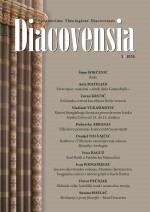UJEDINJENA MONARHIJA I JEROBOAMOVA ŠIZMA
UNITED MONARCHY AND JEROBOAM'S SCHISM
Author(s): Sanela Milišić, Karlo VišatickiSubject(s): Christian Theology and Religion, Ancient World, History of Judaism, Biblical studies
Published by: Katolički bogoslovni fakultet u Đakovu
Keywords: Samuel; Saul; David; Solomon; united monarchy; Jeroboam; Jeroboam’s schism;
Summary/Abstract: From biblical reports in the First and Second Book of Samuel, First Book of Kings, and other biblical writings and non-biblical documents, we are given an overview of the origin of the monarchy in Israel. The Bible texts, in the form known to us today, were edited much later and from a particular theological perspective. We should look at them as theological, rather than historical texts, because they fit neither classical nor modern historiography. The »united monarchy« lasted for a hundred years, as shown in the biblical texts. The texts can be classified as pro-monarchical and anti-monarchical, but they are not clearly distinguished in the biblical books. By the order of God, and against his own will, Samuel anointed Saul as the first king of Israel. Because Saul refused God’s order, Samuel received an order to anoint David as king. The biblical texts show two sides of David. On the one hand, he is a successful and pious king and, on the other, a negative character who, among others, sinned against his soldier Uriah and his wife. His successor, Solomon, came to power through struggles and intrigues. On the one hand, he is known as the wise man par excellence in Israel, on the other, his rule is very extravagant and his subjects can hardly wait for his reign to end.
Journal: Diacovensia: teološki prilozi
- Issue Year: 20/2012
- Issue No: 2
- Page Range: 221-256
- Page Count: 36
- Language: Croatian

